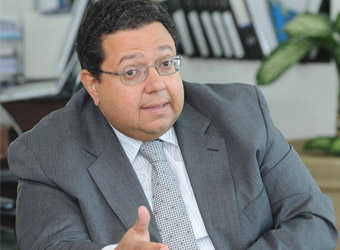Egypt’s new cabinet plans quick steps to spur the economy while laying the ground for a broader “Marshall Plan” to present to Gulf countries and other donors, its chief economic strategist said.
With its options limited by a crushing financial crisis, Deputy Prime Minister for economic affairs Ziad Bahaa El-Din said the cabinet aimed to cut red tape and restart stalled investments to encourage a revival in business activity.
“Ultimately, there isn’t another sustainable source of closing the deficit except to get the economy running, to get growth going, to get people to work, to get incomes paid, to get taxes paid as well,” Bahaa El-Din told Reuters.
“The quicker we get the economy running again, the quicker you can at least begin to stop the bleeding.”
Egypt’s economy has been devastated by two and a half years of political turmoil after the fall of autocrat Hosni Mubarak.
Bahaa El-Din said the cabinet expects to be in power for less than seven months, however, and lacks a popular mandate to take major measures to rein in Egypt’s rising budget deficit.
Put in place after the military ousted Islamist President Mohamed Morsi on July 3, the government inherited a budget deficit that since January has been running at around $3.2 billion a month, equivalent to almost half of state spending.
But it is under intense pressure to avoid unpopular steps such as increasing taxes or reducing spending on energy and food subsidies and the new finance minister said last week it will try to avoid major austerity measures.
Bahaa El-Din, a member of the leftist Egyptian Social Democratic Party, is in charge of an economic team that includes the ministers of finance, trade and industry, supply, planning and investment, as well as the governor of the central bank.
EXISTING PROJECTS
In an interview on Sunday, he said the government is looking to speed up investments already in place rather than seek new projects at a time when investors might still be wary of Egypt.
“It’s not a time when you necessarily expect major new investment to come in,” said Bahaa El-Din, who has a doctorate in banking law from the London School of Economics and until early 2011 headed Egypt’s financial regulatory authority.
Instead, the government will look at changes in rules and regulations and the investment environment, and at encouraging financial institutions once again to take risks and to lend.
“First of all, you need to restore the confidence of those working in the ministries, in the bureaucracy, and they can begin to proceed with their work without being overly worried and looking over their shoulders all the time,” he said.
Businesses complain that since the popular uprising of early 2011 officials have been reluctant to take even minor routine decisions for fear they will be accused of abuse of power or other infractions.
“The quickest thing you can do to get this bleeding stopped is to tackle what is already there, so you don’t have to rethink of new investments on the moon.”
He said he told his colleagues that they would probably find 10 or 20 files of pending things already on their desks.
“You will find 20, 30 investors who are stuck somewhere, for a license, for a permit, for some problem, for a capital increase, for a loan that hasn’t been concluded. This is what I mean by stopping the bleeding and getting things running again.”
“One priority of the minister of industry, for example, is to look at why some of the already existing factories are working below capacity or have been closed or are not fully functional,” Bahaa El-Din said.
MARSHALL PLAN
For the medium term, the cabinet will dust off projects and studies already in the drawers, then put them together into a coherent whole rather than fundraising for them bit by bit.
“There is significant goodwill out there, in the Gulf and elsewhere in the world. Here I come to what I call the Egypt Marshall Plan. You don’t want to be in the situation that when you have the goodwill and the money to be invested you don’t know quite where to take it,” he said.
Officials have warned that the confrontation between the Muslim Brotherhood and security forces could impact investment if it drags on. Witnesses said that security forces killed 80 Muslim Brotherhood supporters on Saturday in Cairo.
Egypt’s position was bolstered early this month with $12 billion in aid from Gulf Arab countries who welcomed Morsi’s removal, and officials have said they expect more such funds.
This could include upgrading the whole physical infrastructure, the logistics infrastructure, the tourism infrastructure, transport, bridges, roads, storage capacity and power plants, Bahaa El-Din said.
The state social fund has plans in the pipeline to create several hundred thousand part-time jobs in infrastructure projects and maintenance, he said.
“Maybe we can have the blueprint of a plan and an Egypt conference put in place,” he added.
Source: Reuters


